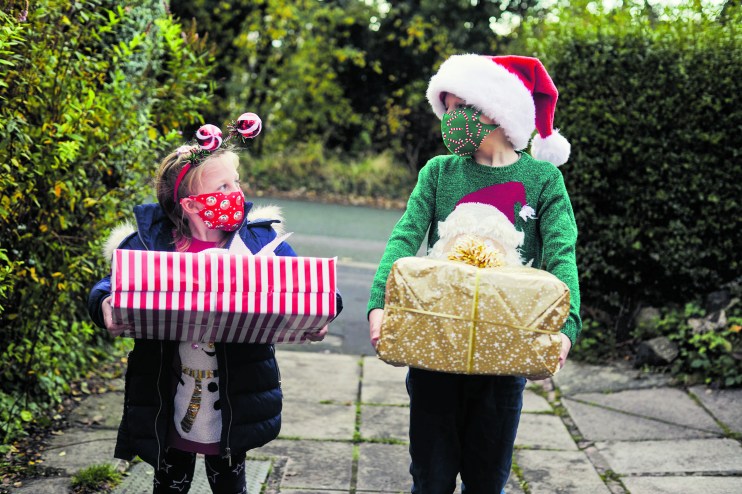Staying safe during the Christmas period

Despite the fact that this year will feel more normal than last, it’s important that we remember that Covid-19 hasn’t gone away; the emergence of a new variant of the virus, Omicron, has reminded us all of the risks.
But with every passing day we know more about the virus – and the best way to fight it.
Getting the booster jab
The most effective way to fight Covid-19 is by getting your jabs. Some 22 million Brits have now had their third, ‘booster’ jab. People aged 30 and over in England can now book their jab, too, with the vaccinations now being given three months on from a second dose rather than after six months.
Importantly, the scientists behind one of the jabs at pharmaceutical firm Pfizer have said that the early evidence is that a third booster jab provides welcome protection against the new variant as well as previous iterations, too. That means that even if you catch the virus, the likelihood of it causing serious harm is significantly reduced.
Every adult in the country now needs to get a Covid-19 booster vaccine, because two doses does not give you enough protection against catching Omicron. Get your booster now at nhs.uk/covidvaccination
Get Boosted Now is the national mission to build a wall of defence against the new Omicron variant. This mission is more urgent and more important than ever before with Covid because Omicron Covid-19 is spreading fast. Vaccines are the best way we can protect ourselves. You can get a Covid-19 booster 12 weeks after your second dose. Boosters give you the best possible protection against the virus and should significantly reduce your risk of serious illness and hospitalisation.
Wear a face covering
We have all become used to ‘masking up’ and the new variant makes that more important than ever as we head towards Christmas – keeping us all safe, and allowing all of us to spend the Christmas we want to have with our friends and family. That’s especially important as we head out for Christmas shopping and socialising.
To protect yourself and others, face coverings must be worn in shops and on public transport. But personal responsibility is important too in other crowded, enclosed spaces where you will be in contact with people that you might not know.
Let the fresh air in
Everybody is rightly excited to meet up with friends and family over the festive period. But that means we also need to be aware of the virus – which we now know is predominantly airborne.
So it’s vital that you open up windows and let the fresh air in. Because the virus gathers like smoke in stuffy rooms, getting a stream of fresh air is hugely important.
We spoke to Professor Tim Sharpe at the University of Strathclyde about why it’s so important.
The vast majority of transmissions have occurred indoors – it’s where we spend the most time in close proximity with other people. One of the issues with the virus is it’s very airborne – when people breathe out, if they have the virus, the particles they breathe out will have the virus. Other people breathe then in and that gives a route of transmission. If you’re close to someone the risk is fairly significant – that’s the major transmission route.
The issue is that small particles stay suspended in the air and float around a little bit. If you’re in that space for some time, they build up and that’s where the risk of longer range may happen in a small space.
The key is to get rid of these particles or dilute them and the easiest way to do this is through ventilation. That’s why ventilation is important. The particles in the air may be smaller with less viral load but over time they will build up which becomes a concern.
The more people you have in a space, the more people who might potentially have with the virus are in that space. Most houses are designed to have a certain amount of ventilation for a normal occupancy but struggle with more people. So when you’re in a room with more people and that room is not well ventilated, your breathe in more of other people’s exhaled breath.
The thing to avoid is bad ventilation – rooms which are very stuffy and not ventilated at all. In winter it’s a difficult balancing act – having windows open all the time will give you problems; you’ll be freezing cold. But there are some ways of addressing that.
Most windows have trickle vents at the top of them so make sure they’re open for background ventilation. And make sure you open the windows – not necessarily all the time but for short periods regularly: open fully for maybe ten minutes every hour to flush things out and clean the air.
And opening windows on either side of your house helps create cross flow which helps expel air.
So open the windows when you can to keep the virus from gathering. Even a relatively short blast can make a huge difference.
Take a test before you see people
Christmas is all about celebrating with the people you love. But with the virus all around us, there are things we can all do that will protect both ourselves and others.
Rapid lateral flow tests are a vital weapon in our armoury against the virus. Remember that around one in three people who have the virus do not have any symptoms, meaning they won’t necessarily know they have it. But even though it may not affect their health, they can pass it on to people who might be hit a lot harder – particularly worrying if they are in contact with vulnerable people.
You are at higher risk of catching or passing on Covid-19 in crowded and enclosed spaces – and we are all spending a lot of time in those spaces in the run-up to Christmas.
So before you meet up with friends and family or head to a busy environment – like a day of Christmas shopping or a restaurant – you should take a rapid lateral flow test to make sure you aren’t unwittingly carrying the virus.
Rapid lateral flow tests can be collected from your School/University if you already obtain test kits from there, from your local Pharmacy: https://maps.test-and-trace.nhs.uk/, from your local Community Test sites – https://maps.test-and-trace.nhs.uk/ or ordered online at Gov.uk : Order coronavirus (COVID-19) rapid lateral flow tests – GOV.UK (www.gov.uk)
- From Tuesday 14th December 2021, if you have been in contact with someone with Covid-19 and are double vaccinated you should take a daily rapid lateral flow test for 7 days if you have no symptoms. This will help slow the spread of the virus and allow you and your loved ones to continue your plans that day if you test negative – This applies to those who have been contact traced officially and those who have found out in any other way.
- All those who test positive within the 7 days or develop symptoms must self-isolate, take a PCR test and follow the latest guidance on gov.uk
- Remember, if you develop Covid-19 symptoms at any time you must self-isolate and take a PCR test.
- If you are unvaccinated, you must continue to self-isolate for 10 days if you are a contact of someone with Covid-19.
- Those working in a vulnerable setting already have access to daily contact testing and should continue to follow the specific guidance from their workplace as this varies depending on the setting.
Listening to the experts this Christmas
Experts all around the world agree on the best way to fight the virus: get your jabs, wear a mask, let the fresh air in and test, test, test.
“Christmas is around the corner and as we are all looking forward to spending more time with family and friends. It’s so important to remember that COVID-19 hasn’t gone away. With this in mind make sure that you are taking the necessary precautions to minimise the risk of the virus spreading. You can do this by making sure indoor spaces are well ventilated by opening windows, even just for ten minutes. Not only this, wearing face coverings on public transport, in public enclosed spaces, in large groups and taking a rapid COVID-19 lateral flow test before special occasions such as meeting up with friends and family or celebrating Christmas with work colleagues will help stop the spread of the virus and keep each other safe.”
DR HELEN LAWAL, AN NHS GP

Don’t forget the NHS COVID-19 app is still the fastest way to know if you’ve been exposed to someone who tested positive for Covid-19, so keep it on at all times and remember to report your test results whether positive, negative or void at www.gov.uk/report-covid19-result
All the information you need to stay safe this Christmas period can be found at gov.uk/coronavirus.